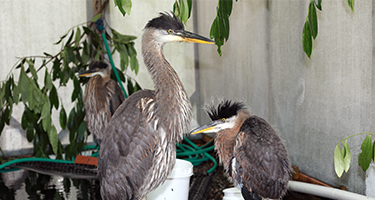Wetlands and Wildlife
Posted February 2, 2021 by Vindi Sekhon

Great Blue Herons relax in a pool at Wildlife Rescue in Burnaby, BC in July.
Wetlands are crucial to our environment, wetlands provide a habitat for a variety of animals such as fish, birds, invertebrates and are an essential part of the earth’s ecosystem. Despite how essential they are to the environment, wetlands are facing challenges daily across the globe.
Over 100 different species live in wetlands, making use of their lush environment. Some of these species include Swamp Sparrows, ducks, Marsh Wrens, geese, Ospreys, Owls, Kingfishers, mallards, and more!
These incredible ecosystems are also known as marshes and ponds, and can be found where land is submerged in water that is salted, fresh, or a combination of the two. These environments are crucial to our survival – not only do they make floods less fatal, but they also provide water for communities, protect nearby cities from hurricanes, and provide us with food.
Here are 10 things that help support this important part of the environment we share with wildlife:
- Avoid harmful chemicals: Using natural alternatives to chemicals when gardening is a simple way to do good since these harmful chemicals can drift into wetlands, harming animals that rely on this ecosystem.
- Throw away seeds responsibly: Seeds that are not native to the environment can do a lot of damage – especially when they are tossed into wetland areas. Make sure to throw your seeds away into garbages whenever possible.
- Plant native flowers: Before starting a garden, check to see what plants and flowers are indigenous to your area – this will provide animals such as birds a place to find food and shelter!
- Treat wetlands with kindness: When visiting wetlands for fun, make sure to treat the area with kindness – clean up your garbage, avoid treading on plants, and make sure not to disturb the animals.
- Keep an eye on pets: Whether you are visiting wetlands or are simply nearby, make sure to keep an eye on your pets. Keeping dogs on leash can make sure they do not disturb nesting parents or precious plants.
- Reduce your carbon footprint: Though it may be simple, reducing our carbon footprints by using less plastic, composting, or simply not littering can have a great impact!
- Use less water: Wetlands need water to thrive, so decreasing the amount of water we use can be extremely beneficial. Try turning off the tap when it is not in use, taking shorter showers, and checking for leaks.
- Pass it on! Spread the word – make sure everyone learns about the importance of wetlands! When you can, educate others on the significance of wetlands in our environments.
- Help injured animals: Making sure animals are treated for injuries is another way to help. If you see a bird that has exposed bone or blood, bugs or insects covering it, no feathers, or a bird that is sleeping, human intervention is required. Please contact our Support Centre for assistance.
- Support Wildlife rehabilitation and recovery: Donating to organizations that work towards preserving wetlands is another great way to help! Click to donate to Wildlife Rescue and fund our mission of rehabilitating animals.
Share this with friends and family:
Posted in What's New
Tags: bc birds, bc wildlife, biodiversity, birds of bc, conservation, marsh wren, marshes, ponds, wetlands, wildlife rescue bc, world wetlands day
